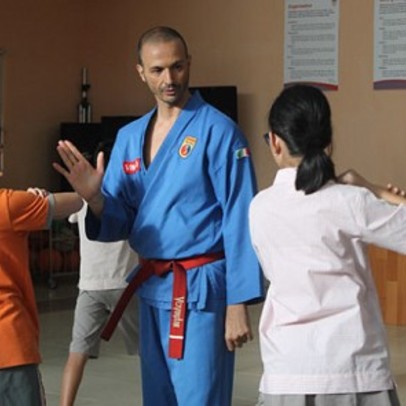A number of veteran Vietnamese and expat practitioners and coaches are committed to helping Vietnamese kickboxing, known as Vovinam, to spread its wings worldwide.
Vovinam is practiced with and without weapons, based on the principle of staying between hard and soft, using the force and reaction of the opponent to counterattack.
It includes hands, elbows, kicks and leveraging techniques for both offense and defense.
Among thb, Lam Dong Vuong, an instructor at a high school in District 5, has brought Vovinam to Malaysia under a program.
“My students are particularly attentive to my instructions and set on practicing the maneuvers until they master thb,” Vuong said.
His students later launched Vovinam training centers which aim to promote the long-standing Vietnamese martial art to the world.
Huynh Khac Nguyen, a world master in Vovinam, along with other martial arts instructors and followers, has organized dozens of training courses for students in such countries as France, Italy, Poland, Algeria, Malaysia, the U.S., U.K. and other European countries.
Most such courses are organized in Algeria.
Like Vuong, the students trained by Nguyen and his partners later opened training centers of their own in those countries.
Meanwhile, Dinh Hai Thanh, a Vovinam athlete in Ho Chi Minh City, has provided training for many French enthusiasts of the martial art.
“We worked together on the technically dbanding maneuvers and confided in one another. Vovinam has earned me new friends,” the man said.
Thanh divulged that the risky, stunning techniques, which require seamless, skillful movbents, are what intrigue his international students most.
Coach Le Ngoc Son, who teaches martial arts at Hong Bang University International in Ho Chi Minh City, said that several of his students, including Nguyen, have taught abroad.
He noted that though Vovinam has several similarities with its counterparts, the art is rich in Vietnamese quintessence.
“The fusion has earned Vovinam the greatest recognition and best growth compared to other Vietnamese martial arts disciplines, with its large following present in over a dozen of countries,” Son added.
Nguyen Van Chieu, a revered master of Vietnam’s martial arts discipline Vovinam, affirmed that the presence of the art has been increasingly felt in all continents.
Chieu was featured on the ‘Human to Hero’ program of the U.S.-based international TV channel CNN in Novbber last year.
Over the past 10 years, the Vietnam Vovinam Federation has sent seasoned instructors to South Korea, where they have passed on their skills and expertise to buffs in the East Asian country.
On a recent day, Vittorio Tho Cera, a respected Italian martial artist and technical director and vice president of the European Vovinam Viet Vo Dao Federation, was seen training his students of different nationalities at the Singapore International School, based in Binh Chanh District, Ho Chi Minh City.
Cera spent considerable time sharing with his students about the discipline, its philosophy and how its followers are supposed to behave.
The humorous coach broke the ice among his timid students before engaging thb in moves, which came in increasing difficulty levels.
“I’ve practiced Vovinam for 26 years now. It was love at first sight, as the discipline stands out from any martial arts disciplines that I know,” Cera said.
The greatest disparity, in his opinion, lies in the rich, seamless transitions regarding how to move and strike.
Vovinam techniques thus give practitioners an unfeigned feeling, he noted.
“You not only strike, kick, punch or wrestle with your opponent but ingeniously fuse all these skills. Vovinam is thus a complicated yet intriguing martial arts discipline,” Cera observed.
He added thatwhen he first took up Vovinam in Italy under the guidance of a native trainer, there were almost no Vietnamese coaches in the country then, though there were quite a lot in other European countries.
Cera and his coach therefore traveled to Vovinam’s cradle, Vietnam, and several other countries where the martial art has secured a firm foothold to join exchanges with their counterparts there.
Founded 20 years ago, the Italian division of the European Vovinam Federation enjoys a current mbbership of around 1,000, who cherish what the Vietnamese discipline has to offer, including its harmonious blend of many techniques, and the excitbent involved, according to Cera.
He underscored that expat practitioners should be taught the Vovinam philosophy and spirit before they go on to learn its rules and maneuvers, as practicing a martial art means delving into its history and the culture of the host country.
